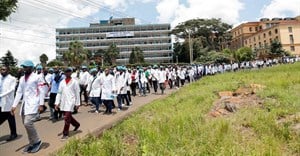Mercury hazards face developing countries
"Mercury remains a major global, regional and national challenge in terms of threats to human health and the environment," said UNEP head Achim Steiner.
Parts of Africa, Asia and South America could see increasing emissions of mercury into the environment mainly because of the use of this element in small-scale gold mining and the burning of coal for electricity generation.
Such exposure "poses a direct threat to the health for between 10m and 15m people who are directly involved in small-scale gold mining, mainly in Africa, Asia and South America," UNEP said.
The announcement comes ahead of a major conference on mercury to be held in Geneva next week and that aims to conclude discussions on a global treaty to minimise risks from mercury exposure.
New reports by UNEP, which will be made public at the Geneva conference, say emissions of mercury from artisanal mining alone have doubled since 2005, partly because of better reporting levels and rising gold prices that have encouraged miners to operate small-scale mines.
Steiner said that a study by the Blacksmith Institute, a New York-based group that cleans up polluted sites, shows that a device costing less than US$10 can be used to trap 90% or more of the mercury used in gold mining.
The main barriers to the use of safer methods are socio-economic along with a low awareness of the risks attached to mercury, a UNEP statement said.
UNEP's new studies provide the first global assessment of releases of mercury into rivers and lakes.
"In the past 100 years, man-made emissions have caused the amount of mercury in the top 100 metres of the world's oceans to double.
Concentrations in deeper waters have increased by up to 25%," the agency said, adding that human exposure to mercury often comes from the consumption of contaminated fish.
Serious mercury poisoning affects the body's immune system and can lead to problems including psychological disorders, loss of teeth and problems with the digestive, cardiovascular and respiratory tracts.
The reports also highlight rising levels of mercury in the Arctic, where 200 tons of the substance are deposited every year.
"Due to rapid industrialisation Asia is the largest regional emitter of mercury and accounts for just under half of all global releases," the UNEP statement said.
The studies also highlight significant releases into the environment linked to contaminated sites and deforestation. The findings show that an estimated 260 tons of mercury, previously held in soils, are being released into rivers and lakes.
The International Negotiating Committee on Mercury will be held from between 13 and 18 January in Geneva.
Source: AFP via I-Net Bridge
Source: I-Net Bridge

For more than two decades, I-Net Bridge has been one of South Africa’s preferred electronic providers of innovative solutions, data of the highest calibre, reliable platforms and excellent supporting systems. Our products include workstations, web applications and data feeds packaged with in-depth news and powerful analytical tools empowering clients to make meaningful decisions.
We pride ourselves on our wide variety of in-house skills, encompassing multiple platforms and applications. These skills enable us to not only function as a first class facility, but also design, implement and support all our client needs at a level that confirms I-Net Bridge a leader in its field.
Go to: http://www.inet.co.zaRelated
Developer sues Sedgefield environmentalist for R5m 19 Mar 2025 Re.Bag.Re.Use: Africa's only winner at the Global Alliance World PR and Communication Awards 2024 28 Nov 2024 Data proves ESG strategies drive superior investment returns 19 Sep 2024 Meet the virtual influencers inspiring climate action 2 Jul 2024






















